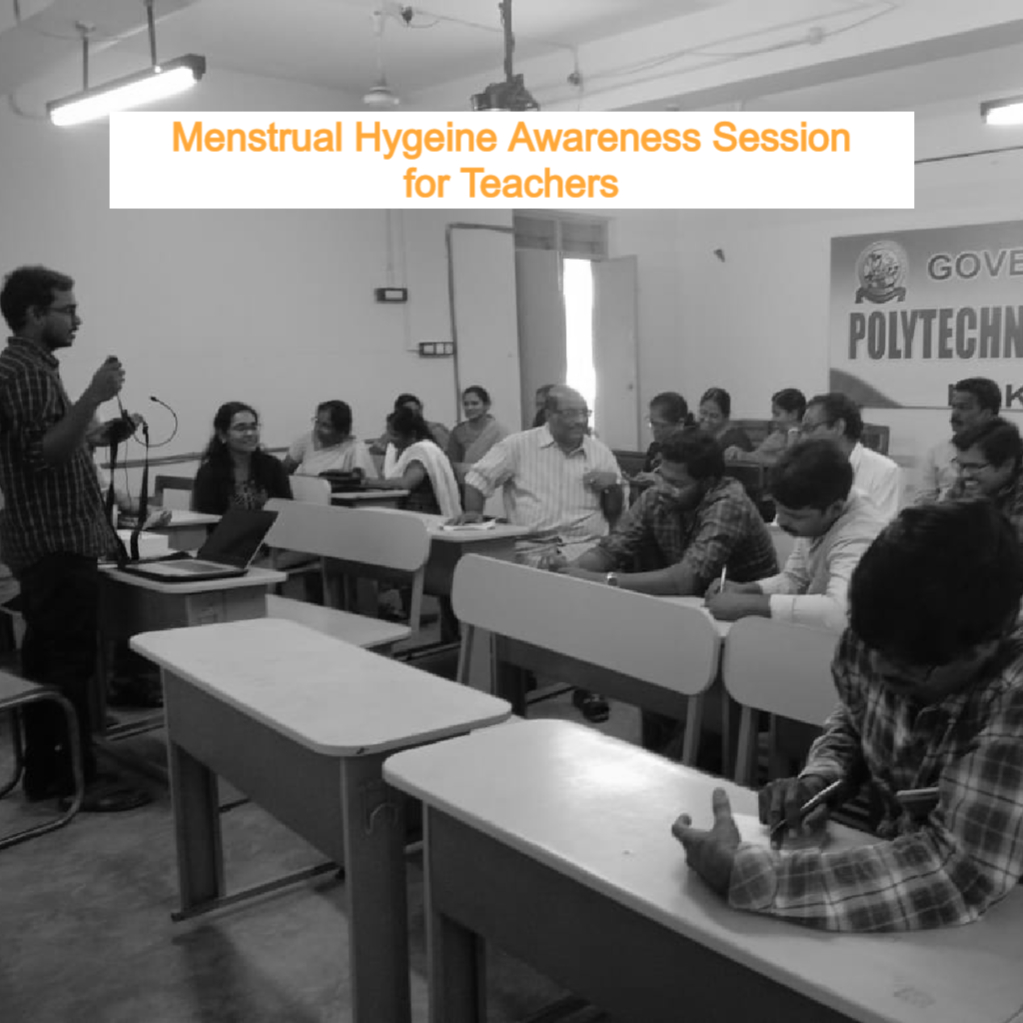In the nuclear families of the current day, a woman may not have other women in the household to help her during Menstruation. She may need someone to take over her daily chores, time to rest, medications for her aches, or the right kind of food to put her at ease.
She could be feeling pain; a rubber hot bag ( Rs. 250/-) really helps. It can be used for any pain, is reusable, and a good investment of money. A woman might need someone to buy her sanitary napkins in emergency conditions when she can’t step out.
So, it is important that men also understand the needs of menstruating women to help them when needed. PCT celebrated Menstrual Hygiene Day on 28th May to spread awareness on the need for men to step in and support the women in their life during Menstruation. To find out our programs for the 28th, please scroll down.

A rally of men organized by PCT to spread awareness and break the gender stigmas around Menstruation.
Taking care of women’s nutritional requirements helps to have a relatively pain-free period. This is why it is essential for everyone in the family to be aware of what happens during menstruation. If you can keep a tab on the menstrual cycles, it helps in taking better care of our women, creating a family and society that is more emotionally intelligent and healthy.
If a woman can freely communicate her needs during Menstruation with her family, especially with the men in her life, she can get the much-needed help during painful periods. Whether she asks for it or not, it’ll be better if someone can be there for her through this.
Share this article with everyone, especially with the men you know.
Menstruation: Inhibitions to share are obstacles to care!
Are you a man who feels too shy to bring sanitary napkins to your mother, sisters, or wife? Are you a girl who is too shy to ask the men in your life to bring you pads, or to tell them that you are getting body aches and physical discomfort during periods? If the answer to either of the above questions is a yes, then this article is written for you.
Pregnancy is treated as a significant event with everyone in the family supporting the woman, menstruation is looked upon as a taboo and the subject is avoided intentionally. It is no secret that the topic of Menstruation is surrounded by lots of culturally imposed secrecy.

Every Menstruating Woman ever: Just because I said I don’t need help, does not mean I really don’t need it.
It’s a taboo and is shrouded by mystery. Because of this, a woman doesn’t receive the necessary support she needs during her period. We think that all the negative attention and excitement around its secrecy have bad side effects. Because of the inhibition to talk about it, women refrain from seeking the help they need while menstruating and most men have no idea that the women even need special care and attention.
Menstruation and Mental Health:
A woman sheds lots of blood and a layer of cells along with the unfertilized egg that is released in her body during menstruation; if fertilized, the egg will form a baby. Menstruation enables pregnancy.

See how hormones and organs work together to run the Menstrual Cycle? It might strike as seemingly insignificant, but hormonal changes kick off different stages of the Menstrual Cycle and lead to shifts in the mood of a woman during various stages of the cycle.
It is general knowledge that women need the right nutrition, attention to physical unease, and special awareness of her elevated emotional responses (read mood swings) during pregnancy. But how many of us are aware that menstruating women also need all these?
The mood shifts during menstruation are so significant that doctors performing post- mortem on female suicide cases first check if they are menstruating at the time of committing suicide. Chances of being in heightened emotional states are pretty high during Menstruation, leading to heightened emotions if things escalate during those days.
Supporting Menstruating Women in Professional Settings and Educational Institutions
Most girls have had days when they were in the middle of a class when they realize that they got their period. A feeling of panic follows. Sometimes they may not have a sanitary napkin and struggle to ask their friends without getting called out by the teacher for disturbing the class. Some of them might have stained their clothes or felt immense pain but hesitated to ask for permission to leave school to rest or change clothes.
PCT Team holds workshops for faculty too. Like any other group, awkwardness, hesitance, and sheepishness are the initial reactions to the topic. If teachers feel hesitant to get the necessary awareness on the issue, how can they enable their students to seek help without hesitation? The session tries to understand Menstruation, and its physiological, psychological, financial, and cultural aspects.

PCT Session for the Teachers of Government Polytechnic College, Kakinada.
Teachers must feel free to help girls during hard menstruation days. So it is essential for them to have enough awareness of Menstruation and methods of responsible intervention to support girls in such situations. In the same way, if workspaces are sincere about having a good working environment for women, they can become more accomodating to the needs of menstruating women.
Workspaces are inclusive of Pregnancy. They provide paid holidays and maternity leaves for months. But the same institutions are relatively silent on extending similar care for Menstruation. Very few office spaces are open to a dialogue on the needs of menstruating women. An “fop” or “first day of a period” leave can be the first step in that direction.
The Economy of Menstruation: Finances affecting Menstrual Hygiene
Every time we go to a government school, a rural area, or a slum, we talk to the women about the menstrual hygiene practices they follow. Most often than not, they use cloth for their bleeding. Some women wash the same cloth and reuse it. It is not the most comfortable or hygienic choice they can choose from.
The first time a girl gets her period, it is called Menarche. In some parts of South Asia, a big function is celebrated to mark this event. In our experience in rural India, we’ve seen families going into debt trying to celebrate Menarche.
If one can let go of false prestige and pomp, the same amount of money can be invested in education, financial investments for the future, or giving the girl good nutrition for years to come. These would actually empower the girl.
They are hesitant to dry these menstrual clothes in the sun as they are too shy that the men and others will see them. The absence of sun drying and repetitive usage of the same cloth will result in the breeding of viruses and bacterial colonies on the cloth, leading to vaginal infections. They usually do not have access to gynecological care and suffer in silence.
There are several reasons why women do not use other options for Menstrual Care.
- Collective Habit: They got used to using a cloth. Most of their peers use a cloth.
- Logistical Issues: Unavailability of pads / menstrual cups in the shops nearby. Difficulty in disposing of sanitary waste due to a lack of waste collection options in remote areas.
- Cost: A pack of sanitary napkins costs 20- 30 rupees. A woman would need 2 every month. She usually doesn’t feel like she could spend that amount of money for herself.
Some women buy pads for their kids but not for themselves. If a woman in a family is convinced that her needs do not deserve 60 rupees per month, that speaks more about how worthy, inclusive, and deserving she feels within the family. This is why awareness is important; this is where men should step in and support them in buying.
Due to several cultural factors, they may feel inhibitions to go and buy sanitary napkins. Family members can make women feel empowered and cared for by discussing their Menstrual Hygiene requirements and allotting a budget for it.
Within a family, pregnancy is treated as a group support project for 9 months. Many employers are sensitive to the needs of a pregnant woman giving her much-needed support like maternity leave. We all support a pregnant mother in every way. It’s about time we extend it to Menstruation too.
If you’d like to read about what our young ladies have to say about Menstruation: Read Express Menstruation
Written by Pavani Sairam




I would like to thank you for the efforts youve put in writing this blog. I really hope to see the same high-grade blog posts from you in the future as well. In fact, your creative writing abilities has encouraged me to get my own website now 😉
Itís difficult to find experienced people in this particular subject, but you sound like you know what youíre talking about! Thanks